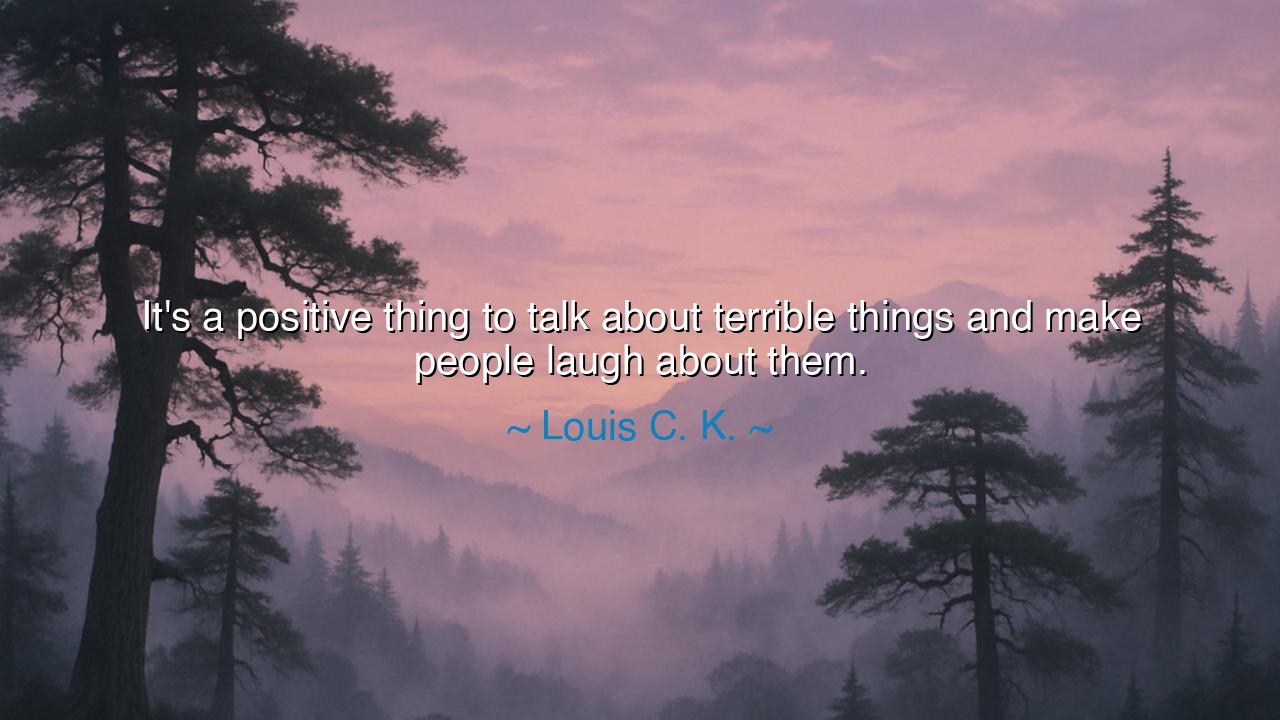
It's a positive thing to talk about terrible things and make






The words of Louis C.K.—“It’s a positive thing to talk about terrible things and make people laugh about them”—reveal the ancient power of humor as medicine for the soul. He speaks of a paradox that is as old as human suffering: that even in the darkest trials, a spark of laughter can pierce the gloom. By making light of the heavy, we do not deny its weight, but we rise above it, refusing to let sorrow consume us. To laugh at tragedy is not to belittle it, but to declare that the human spirit is greater than despair.
The origin of this truth lies in the dawn of storytelling itself. Around the fires of early tribes, men and women would recount the hardships of the hunt, the cruelty of storms, the loss of kin. Yet often these stories were laced with humor, for laughter bound the tribe together and gave courage to face the next day. In this way, humor became not a denial of terrible things, but a weapon against them, a shield for the heart.
Consider the story of the court jesters of medieval Europe. In kingdoms marked by war, famine, and plague, jesters dared to speak of the darkest truths through satire. They mocked tyrants, they turned fear into comedy, and in their boldness, they gave the people relief. A king might rage, a people might suffer, yet the jester’s laughter reminded all that despair was not the final word. In this way, humor kept hope alive in times of ruin.
Think also of the prisoners in the Nazi concentration camps, who, though surrounded by death, sometimes told jokes to one another. Survivors recall that a whispered jest, a shared laugh, was like a breath of life in a place designed only for despair. Here, more than anywhere, we see the truth of Louis C.K.’s words: to laugh at terrible things is to reclaim one’s humanity in the face of cruelty.
The meaning of this quote is not that suffering is unimportant, but that it must not be allowed to break the soul. Laughter is rebellion, a declaration that sorrow cannot command the whole heart. When people find humor even in the midst of darkness, they do not erase the pain, but they transform it, making it bearable, turning it into a story shared rather than a burden carried alone.
The lesson for us is luminous: when you face hardship, do not be ashamed to laugh. Seek out humor not as a dismissal, but as a form of strength. When speaking of terrible things, let there be room for joy as well as sorrow, for in the balance of both lies resilience. To comfort others, bring them laughter as well as tears, for one gives meaning and the other gives endurance.
Practical wisdom calls us to act. When life places heavy burdens upon you, gather with others and share stories that make even tragedy seem absurd. Use humor to heal divisions, to speak truths that are hard to say, to lighten the weight of the moment. And when you hear laughter in dark places, do not silence it—honor it as the flame of courage that refuses to be extinguished.
Thus, let Louis C.K.’s words endure as a reminder that laughter is not a trivial thing, but a weapon of the spirit. To joke about pain is not to dishonor it, but to rise above it. For if we can laugh at our sorrows, we prove that they do not rule us; we rule them. And in that victory of the heart, we find the strength to endure, to heal, and to move forward into the light.






TNNguyen Thi Thu Nguyet
Humor is often used as a coping mechanism in difficult times, but Louis C.K.'s perspective raises an interesting question: Can laughing at terrible things actually empower people, or does it leave them feeling desensitized? How do we navigate the fine line between using humor to cope and inadvertently perpetuating a culture that avoids deep emotional engagement with important issues?
BNpham bich ngoc
Louis C.K. implies that talking about painful subjects with humor can help make them more manageable, but is this true for everyone? How do individuals process humor differently, especially when it involves sensitive topics? Could humor potentially cause harm by making light of traumatic events, or does it provide a healthy outlet for emotions?
TCTa Thuy Cham
The idea of making people laugh about terrible things sounds therapeutic, but is it always appropriate? Can humor bring people together during challenging times, or does it risk turning something serious into a joke? How can we use humor responsibly to acknowledge tough issues without making them seem less important?
VTVan Tien
Louis C.K. raises an interesting point about laughter being a way to handle painful topics, but does it ever go too far? How much of a role does cultural context play in how we approach humor around sensitive issues? Is it possible for humor to unite people and provide catharsis, or does it sometimes widen the divide by making light of others’ suffering?
QABui Quoc An
While humor can provide a release in tough situations, I wonder if there’s a danger in using it as a defense mechanism. Does making light of terrible things undermine the severity of the issues at hand? At what point does humor become a way to avoid confronting the real problems rather than addressing them head-on?